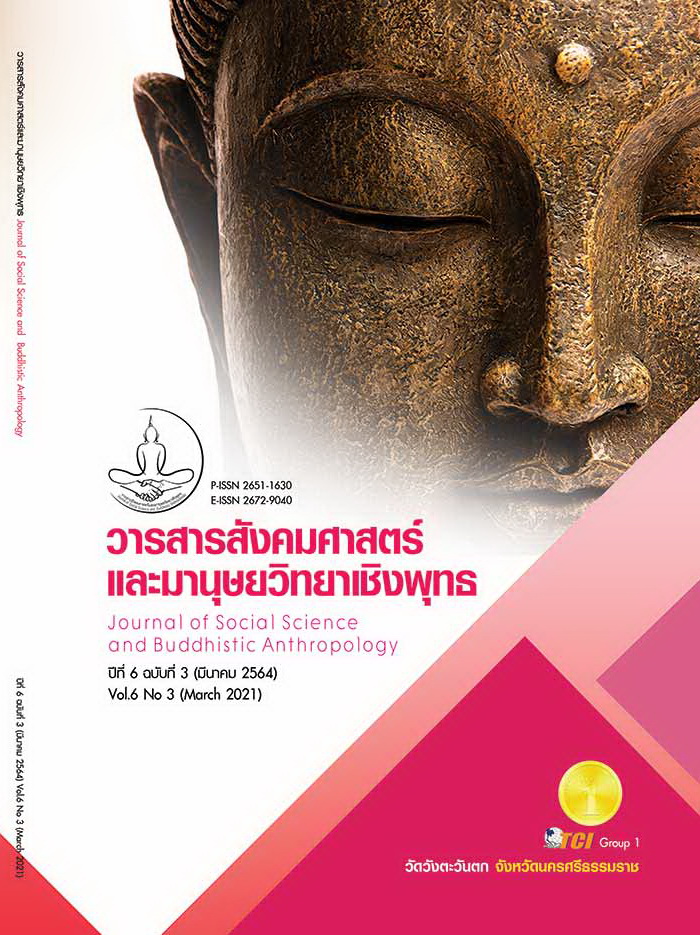DEVELOPING THE TEACHER DEVELOPMENT MODEL TO ENHANCE SCIENCE LEARNING MANAGEMENT OF ELEMENTARY SCHOOL TEACHERS BASED ON PROFESSIONAL LEARNING COMMUNITY
Keywords:
Teacher Development Model, Science Learning Management, Professional Learning CommunityAbstract
The objectives of this research article were to: 1) study the indicators of science learning management quality of elementary school teachers; 2) develop the teacher development model to enhance science learning management of elementary school teachers based on the professional learning community; and 3) study the effectiveness of the teacher development model. This study was a research and development. The research participants were 15 elementary school teachers of science with a non-science degree through purposive sampling to study of the effectiveness of the model. The research instruments were the teacher development model, the evaluation form of learning management quality, and the satisfaction questionnaire. The Wilcoxon Signed Rank Test was used for hypothesis testing. The findings of the research revealed the following: 1) the indicators of science learning management quality of elementary school teachers consisted of four factors and 15 indicators for the following sub-indicators: four indicators for learning management, six indicators for activity management, two indicators for learning materials and learning resources, and three indicators for the learning evaluation; 2) the teacher development model consisted of six elements: 2.1) background and significance; 2.2) principles; 2.3) objectives; 2.4) content; 2.5) the PLCCCA process; and 2.6) evaluation; 3) the results of the effectiveness of the teacher development model found that the quality of the learning management of science teachers when compared with three performances, the tendency was high and significant at a level of .05, and satisfaction with the teacher development model was at the highest level.
References
จันตรี คุปตะวาทิน. (2552). หน่วยที่ 3.1 หลักสูตรสาระการเรียนรู้วิทยาศาสตร์ ในประมวลสาระชุดวิชาการพัฒนาหลักสูตรและสื่อการเรียนการสอน หน้า 5-25 สุวรรณี ยหะการ (บรรณาธิการ). นนทบุรี: มหาวิทยาลัยสุโขทัยธรรมาธิราช.
ฉัตรชัย หวังมี และองอาจ นัยพัฒน์. (2560). สมรรถนะของครูไทยในศตวรรษที่ 21: ปรับการเรียนเปลี่ยนสมรรถนะ. วารสาร HR intelligence, 12(2), 47-63.
ปองทิพย์ เทพอารีย์. (2557). การพัฒนารูปแบบชุมชนแห่งการเรียนรู้เชิงวิชาชีพสำหรับครูประถมศึกษา. วารสารศิลปากรศึกษาศาสตร์วิจัย มหาวิทยาลัยศิลปากร, 6(2), 284-296.
มนตรี แย้มกสิกร. (2560). กระบวนททัศน์ที่จำเป็นต่อการพัฒนาครูในระบบและรูปแบบการพัฒนาครูที่เหมาะสมกับความเป็นไทยและความเป็นสากล. กรุงเทพมหานคร: บริษัทพริกหวานกราฟฟิค จำกัด.
วัชรา เล่าเรียนดี. (2556). ศาสตร์การนิเทศการสอนและการโค้ช การพัฒนาวิชาชีพ: ทฤษฎีกลยุทธ์สู่การปฏิบัติ. นครปฐม: โรงพิมพ์มหาวิทยาลัยศิลปากร.
วิจารณ์ พานิช. (2555). วิถีสร้างการเรียนรู้เพื่อศิษย์ในศตวรรษที่ 21. (พิมพ์ครั้งที่ 4). กรุงเทพมหานคร: ตถาตาพับลิเคชั่น จำกัด.
วิชัย วงษ์ใหญ่ และมารุต พัฒผล. (2562). การพัฒนาคุณภาพการจัดการเรียนรู้ ตามแนวคิดชุมชนแห่งการเรียนรู้ทางวิชาชีพ. กรุงเทพมหานคร: จรัลสนิทวงศ์การพิมพ์ จิกัด.
สถาบันส่งเสริมการสอนวิทยาศาสตร์และเทคโนโลยี กระทรวงศึกษาธิการ. (2555). ครูวิทยาศาสตร์มืออาชีพแนวทางสู่การเรียนการสอนที่มีประสิทธิภาพ. กรุงเทพมหานคร: อินเตอร์เอ็ดดูเคชั่นซัพพลายส์.
สำนักงานคณะกรรมการการศึกษาขั้นพื้นฐาน. (2553). คู่มือการประเมินสมรรถนะครู สำนักงานคณะกรรมการการศึกษาขั้นพื้นฐาน พ.ศ. 2553. เรียกใช้เมื่อ 4 ธันวาคม 2562 จาก http://www.tmk.ac.th/teacher/capasity.pdf.
สำนักงานคณะกรรมการการศึกษาขั้นพื้นฐาน. (2560). ตัวชี้วัดและสาระการเรียนรู้แกนกลางกลุ่มสาระการเรียนรู้วิทยาศาสตร์ (ฉบับปรับปรุง พ.ศ. 2560) ตามหลักสูตรแกนกลางการศึกษาขั้นพื้นฐาน พ.ศ. 2551. กรุงเทพมหานคร: โรงพิมพ์ชุมนุมสหกรณ์การเกษตร แห่งประเทศไทย จำกัด.
สำนักงานเลขาธิการคุรุสภา. (2561). คุรุสภา: PLC ชุมชนแห่งการเรียนรู้ทางวิชาชีพ (Professional Learning Community). เรียกใช้เมื่อ 4 กุมภาพันธ์ 2561 จาก https://sites.google.com/a/esdc.go.th/kpt1-plc/home/plc1.
สำนักงานเลขาธิการสภาการศึกษา กระทรวงศึกษาธิการ. (2561). สมรรถนะการศึกษาไทยในเวทีสากล ปี 2560 (IMD 2017). กรุงเทพมหานคร: สำนักพิมพ์ 21 เซ็นจูรี่ จำกัด.
สำนักงานเลขาธิการสภาการศึกษา กระทรวงศึกษาธิการ. (2562). สภาวะการศึกษาไทยปี 2560/2561 ฐานข้อมูลกับการบรรลุตามเป้าหมายแผนการศึกษาแห่งชาติ พ.ศ. 2560 - 2579. กรุงเทพมหานคร: สำนักพิมพ์ 21 เซ็นจูรี่ จำกัด.
สิรินภา กิจเกื้อกูล. (2557). กรณีศึกษาการพัฒนาสมรรถนะการจัดการเรียนรู้วิทยาศาสตร์ประถมศึกษาในโรงเรียนขนาดเล็ก. วารสารศึกษาศาสตร์ มหาวิทยาลัยนเรศวร, 16(2), 165 - 171.
Hassan, R. et al. (2018). Professional Learning Community in Malaysia. International Journal of Engineering & Technology, 30(7), 433 - 443.
Mazano, R. J. (2003). What works in schools: Translating Research into action. Alexandria, VA: Association for for Supervision and Curriculum Development.
Tam, A. (2014). The role of a Professional learning community in Teacher change: a perspective from beliefs and practices. Teachers and Teaching Theory and Practice (Teachers Teach Theor Pract), 21(1), 1-22.
Thompson, G. & Niska, J. M. (2004). Professional learning communities, leadership and student learning. Retrieved February 8, 2018, from http://www.nmsa. org/ Publicationa/RMLEOnline/tabid/101/Defacuit.aspx.









